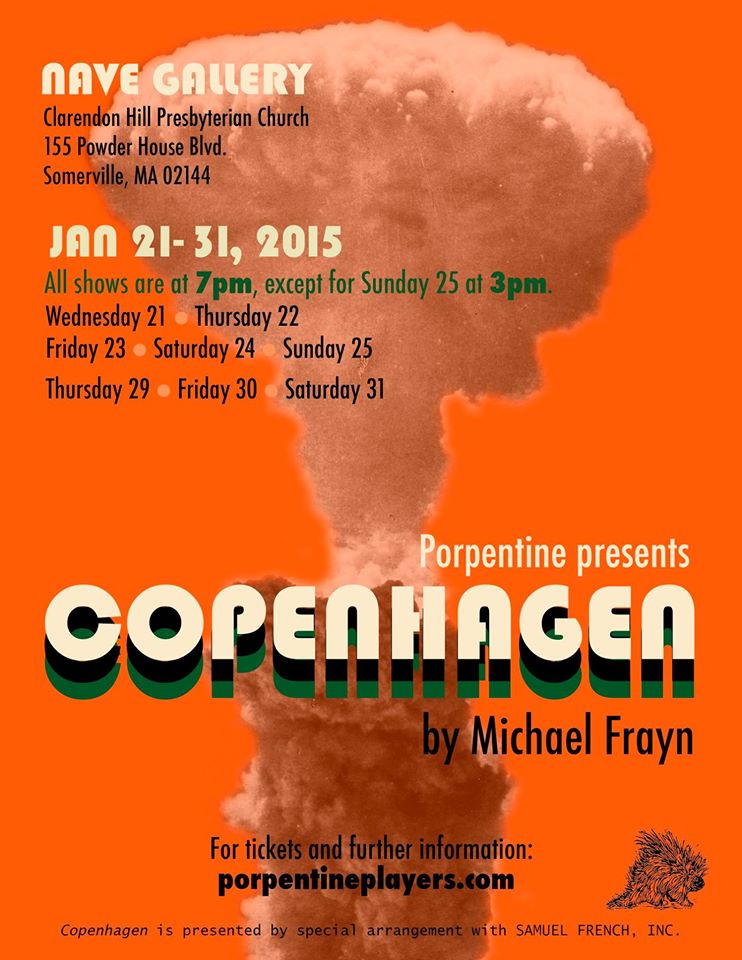
Presented by Porpentine Players
By Michael Frayn
Directed by Jon Taie
January 21 – 31, 2015
Nave Gallery
155 Powderhouse Blvd
Somerville, MA
Porpentine on Facebook
Review by Kitty Drexel
(Somerville, MA) Science is having a moment in the public sphere; thanks to actors such as Eddie Redmayne and Benedict Cumberbatch, physics and math are sexy and everyone wants a piece of these oh so marketable, oh so male institutions. Suddenly it’s very chic to flout one’s comprehension of STEM studies. While I’m grateful that movies such as The Theory of Everything and The Imitation Game exist, the media forget that the theories discussed in these films aren’t as digestible as the script treatments suggest. Science and math are complicated beasts. So complicated that most American elementary and high school students have difficulty grasping remedial skills. Thus, a delicate balance must be maintained when explaining scientific and mathematical theory via the media to the hoi polloi. It must educate while still communicating the advancement of skill required for application. Hollywood tends to over-simplify. Frayn’s Copenhagen, as produced by the Porpentine Players keeps in complicated.
In Sept. 1941, German theoretical physicist Werner Heisenberg and Danish physicist Niels Bohr briefly met to discuss the application of theoretical and nuclear physics in Nazi weaponry. Hitler wanted a nuclear bomb and Heisenberg was thought to be the man to give him one. In Copenhagen the ghosts of Heisenberg (R. Nelson Lacey), Bohr (Floyd Richardson) and Margrethe Bohr (Ann Carpenter) discuss what exactly was said in the meeting between the two physicists. To summarize, Copenhagen is about two highly intelligent men laying into each other for the presupposed benefit of the audience. This wham zinger of a script isn’t for amateurs, theatrical or otherwise.
Playwright Frayne is a pretentious madman. He assumes the audience knows the math, the history, and the science necessary to keep up with his script (which is 45 minutes too long). It is grandiloquently verbose even when asserting that experiment results be explained in simple, “ordinary language.” He’s crammed his script with so much unexplained history, elitism and SAT words that it should be graduating summa cum laude next spring. He also assumes that actors have the skill to communicate with his words all the subtextual influences he hasn’t given them. It’s overwhelming and patronizing. To boot, he uses the only female character as sassy set dressing. No sir, I don’t enjoy this play; theatre shouldn’t require a tutorial to understand its goings on.
The Porpentine Players did an admirable job with the script, the science, and the space. The programme was chock full of useful information about Hiroshima and nuclear physics. To keep the audience engaged, all three actors broke the 4th wall to speak directly to us. They humanized their characters and gave the audience a reason to unglaze their eyes. Unfortunately, as the play is less about the human condition and more about the condition of two humans, their efforts weren’t enough to keep us interested through the end of the show. This is not their fault but the fault of Frayn.
Copenhagen is 2.5 hours long and features three characters, two of whom do the majority of the speaking. As stated, the script is complicated and requires great concentration. Lacey and Richardson did an excellent job with the script. Lacey kept a steady pace while Richardson maneuvered around him. They kept a good rapport with Carpenter who did less of the talking but most of the explaining to the audience.
The Nave Gallery has bathroom-like acoustics that amplify the smallest of sounds. Actors fought against echoes of their own footsteps and the small noises from their patient audience. In such a space, lines get lost unless spoken firmly into the void but when the actors turned their backs, we lost even more clarity (considering the repetition of the script, this was mostly acceptable). The Nave might be a fun space to work in with its track lighting, size, and accessibility, but it’s limitations are many.
Theoretical philosophers with no intent to apply their philosophies will love this play. History buffs* could get a kick out of it. I’m glad that I saw this production because it means supporting local theatre. I have no intention of seeing it ever again. The next time I want to see two men wailing at each other while a woman watches, it will be on pay-per-view.
*2015 marks the 70 year anniversary of America’s attack on Hiroshima. We killed 30% of the people living there. Heisenberg was trying to beat the US to the atomic bomb. If he had succeeded it is likely that Germany would have won WWII. Let that sink in. Heisenberg received a Nobel prize. Bohr had to flee Denmark because he was ½ Jewish. The Allies won the war but we also killed thousands of innocent Japanese citizens. Go us.
